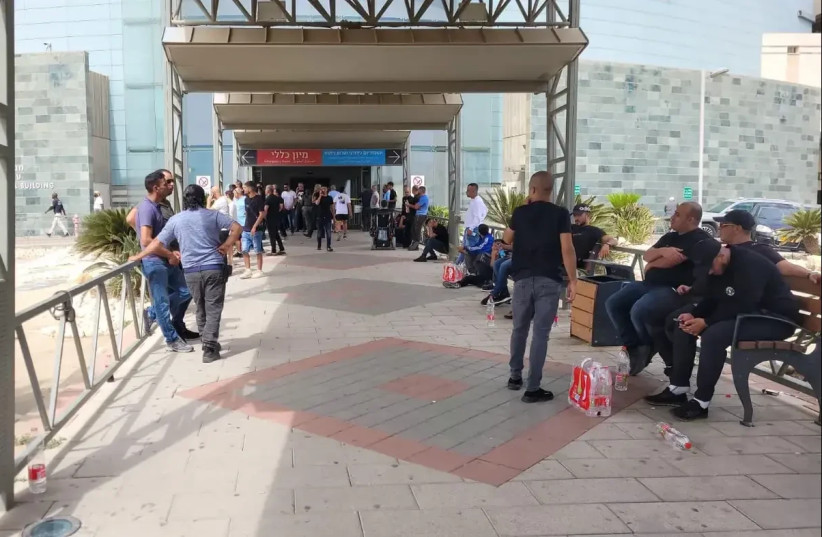An emergency room was to be completed in Sderot so that residents of this heavily bombarded city would no longer need to worry about traffic jams on the way to Barzilai Medical Center in Ashkelon, or Soroka Medical Center in Beersheba, where they would be rushed to in cases of emergency for lack of there being a closer medical facility nearby.
But will it indeed be built? Well, that depends on who one asks. At the beginning of the week, Tamir Steinman of Channel 12 reported that the emergency medical center that was supposed to open in Sderot will not be opening after all, since the budget necessary for its operations could not be found.
The following day, Alon Davidi, Sderot's mayor, was quick to deny this report. According to him, the completion of the project did not depend on the Finance or Health ministries, who gave Steinman ambiguous answers, but on the Development of the Negev and the Galilee Ministry, who is set to approve the required budget.
Currently, in cases of emergency, residents of Sderot are treated at their local Health Maintenance Organization (HMO) clinics only.
Arguably, this situation was flawed to begin with, prior to the Israel-Hamas war breaking out. More so, when the Israeli government wants to bribe Sderot's residents so that they relinquish their will for security in exchange for money, as the resonance is much greater, and rightly so. Why this harsh phrase, "bribe?" Because it is difficult to otherwise define what the government is doing.
At the beginning of the war, the inhabitants of Sderot were evacuated from their homes with the promise that they would not return to the city and houses until the area was secure, similar, for example, to what was promised to the residents in the center of the country. It may be that the prime minister is, and for that matter, that we are right on the verge of a complete victory over Hamas, but currently, Sderot is very much still within firing range. Although shelling has gradually decreased since the IDF began its ground maneuver, the same routine of sporadic bombardment toward the city that made the lives of Sderot residents miserable long before the current campaign went underway, continues to date.
Although it has not yet won the war and restored security to the residents of the western Negev, the Israeli government has offered them an unusual deal: Return grants that will decrease in value the longer it takes the populace to go back to Sderot. In other words, those who choose to go back to the city now, will receive 100% of the grant. On the other hand, those who choose to wait and see if victory is indeed around the corner, as promised by the prime minister (who promised them back in 2009 to "overthrow Hamas's rule"), will be forced to contend with receiving a lesser sum.
This mechanism would be infuriating regardless of which evacuated settlement this was done to, even a higher socioeconomic area, like Savyon. However, this is doubly infuriating when such temptation is placed at the doorstep of people – so many of whom are struggling to make ends meet. They are being asked to abandon their safety in exchange for monetary compensation, which they desperately need. That is the equation.

From an economic standpoint, the offer is logical. A resident who wishes to stay in alternative housing costs the state money every day, therefore the sooner one returns to home, the less the state pays.
All of these points would have been valid even if there was an ER in Sderot that could provide emergency medical care even before people were rushed to the hospital for further treatment.
Moreover, not only is the Israeli government trying to bribe the residents of Sderot, it is also doing it with their own money: An essential project is delayed due to a lack of budget, but there is money when it comes to returning the evacuated back to their homes.
A see-through move
After the government pulled the plug on the ER project last year by preventing it any and every which way, and was (rightfully) severely criticized for doing so, it finally decided in May 2023 to approve the project in the North (Kiryat Shmona, where the situation is very similar to that of Sderot, and in the South (August 2023). According to Steinman's report, the money is actually available for the construction and completion of the project. There isn't enough of a budget, however, to continuously run the ER.
How much money is involved?
Millions of shekels when it comes to office budgets. Which brings us to the "small money": the one whose transfers from office to office, from hand to hand and pocket to pocket, are hardly covered by the media, which is used to dealing with billions or at least hundreds of millions of shekels. Budgets of millions often slip under the radar, although sometimes it is political bribery. This is how weeds grew, such as the Ministry of Settlement (a conduit for transferring funds to the base of religious Zionism) or the Ministry of Heritage - ministries whose role is not to provide services to the citizens but to "launder" sectoral funds.
The evacuation of the south and the north was a security necessity, few would dispute that, but it was possible to use the long months in which the residents were (and still are) absent from their homes to carry out an investment revolution in the settlements, to decide that since half of the government offices are redundant anyway, it is possible to direct the funds to the periphery that needs them in order to return to the routine, from the moment she feels confident. It is amazing to see how the current government continues to take full advantage of the credit it received from the residents of the periphery, a large part of whom are loyal Likud loyalists.
So, the Likud spits in the face of their voters, but only those who vote for them in the general elections, not in the internal elections – not in the primaries.
The indications
While smokers woke up a few days ago to a reality in which cigarettes and tobacco products have become more expensive, employees of the Airports Authority woke up with a smile. The Likud didn't even bother to whitewash that its Knesset members voted in favor of excluding cigarettes sold at the duty free, from which these employees profit, from the updated tax.

Why? Once again, the Likud deserves praise for its impressive honesty: the employees of the Airports Authority, a body that benefits from duty free revenues (a large part of which comes from cigarettes), are united in good numbers to the Likud to a point that, in fact, together with other bodies (from legitimate stakeholders such as the employees of the aerospace industry, to contractors who are nothing more than representatives of criminal organizations), they determine the composition of the list for the Knesset.
So, if the residents of Sderot want someone in the Likud to take them seriously, they should not only support it at the ballot, but function as key members within its ranks and become a pressure group. Perhaps then, unlike now, that government could not ignore Sderot's Kiryat Shmona's mayors. Maybe then, these citizens will be treated like winners, even if this comes at the expense of the rest of us.
Sounds extreme, I know. But no more than waiting forever to get to a hospital only to die en route.
